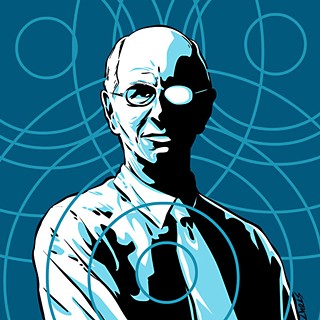Reading the late James Hillman’s Selected Writings (edited by Thomas Moore) frustrates me because Hillman deals with terms — soul, archetype, spirit – that by his own definition defy definition. He creates metaphors, uses Greek gods and goddesses as examples. The gist is that like Steppenwolf’s Harry Haller, we have an infinite number of selves that slosh around the in a murky swamp of soul, a sort of neuronbuzz that connects mind to body. What frustrates me is his lack of empiricism – where does he get his ideas? from an oracle? Nor does he provide case histories to help embody these archetypal inner beings.
Nevertheless, I agree with much of what says about our contemporary world, and he offers some wonderful turns of phrase.

illustration of James Hillman by Jason Stout
For example:
Dumb sex is cultural. Our white American speech doesn’t provide good words for genitals and intercourse – and hardly any phrases about places, rhythms, touches, and tastes. Listen to the marvelous language of foreign erotica; jade stalk, palace gates, ambrosia! Compare these with cock, prick, dick, nuts, balls, with suck, jerk blow, yank, and with gash, bush, frog, slit, clit, hole. A Chinese plum is to be deliciously enjoyed; our cherries are to be taken, popped, or broken [. . .] Our Puritan prose cannot encompass the sexual imagination to which great temples are built in India.
The human person as a data bank does not need to read more than functionally. A data bank deciding yes or no on the basis of feedback (i.e. reinforcement) need not imagine beyond getting, storing, and spending. Just get the instructions right; never mind the content. Learn the how rather than the what with its qualities, values, and subtleties. The human agent becomes an incarnated credit card performing the religious rituals of consumerism.
[. . .] places tend to remind us of history, of ethic and earthly differences that cannot be homogenized into the universal sameness of our contemporary utopias, the nowhere everywhere of our shopping centers and roads to and from them.

West Ashley (Charleston, SC at rush hour
So, according to Hillman, materialism has triumphed over spirituality.
Although perhaps generally true, it certainly isn’t universally true. I cannot think of one close friend who prefers things to experiences, who would drive a Range Rover at the expense of not being able to travel. The few very wealthy acquaintances I know are interested in both mind and spirit and never flaunt their fortunes. And my Chico Feo bar buddies, many who live from paycheck to paycheck, seem well satisfied with their lives. Before work each morning (and perhaps, even more impressively, on weekends), my friend Jason watches the sun rise above the Stono River and then posts a photograph with an accompanying prose passage, poem or song.

Today’s (11 July 2018) sunrise captured by Jason Chambers
Nevertheless, fighting traffic at rush hour through a wasteland of billboards and cell phone towers on the thoroughfares Hillman describes does indeed suck/blow/yank — especially if you’re in a hurry. But if you’re riding in an air-conditioned vehicle with a system that plays music or words you select, you shouldn’t complain too loudly.
Summon your inner Apollo or Athena, or, in my case, given that I’m likely to be listening to James Brown or the Rolling Stones, inner Dionysius.
And remember (see the story of Lazarus for an example) Jesus was never in a hurry.

Jason and Me at Chico Feo (photo credit Caroline Traugott)
I have heard our vocabulary suffered with the onslaught of the Industrial Revolution bc we don’t hear soothing things that put our mind at ease the way we once did. I subscribe to this theory and have high hopes for the quiet hybrid in the Prius.
How can I fix this sentence without changing the idea: “If I were to have come, I would have had fun.” Or you probably are familiar with this one:”If I were your wife, I would put poison in your coffee. [Attributed to Lady Astor, speaking to Winston Churchill]… or is would a different verb altogether. The main thing I am trying to ask is how not to use “have” twice (or more) in a sentence since I learned it is not good form. I often hear people say “If he had had….” and can’t figure out the best way to express it.
What you’re dealing with here are perfect tenses and the subjunctive mood. In the subjunctive mood, you’re dealing with theoretical or hypothetical situations that aren’t real. That’s why you’re using “were” instead of “was,” Like in the song “If I were a carpenter, and you were a lady.” I’m not a carpenter, and you’re not a lady, so you use were and always past tense verbs. The perfect tenses, which us has, have, or had, as auxiliary verbs, deal with two instances of time. To say or write I had had five beers before I was arrested, is grammatically correct because we’re talking about an action that was completed (or perfected) before another action occurred. Present perfect deals with an action that began in the past but is still occurring. E.g., I have taught English for the last 30 years. So, bottomline, it’s sometimes necessary to use have or had twice in a sentence.
And now I know I’m in the know.
I am watching I’m Not There which depicts Bob Dylan’s rabbit hole-style of life. As for Day 543 of a Red Bull of infinite voluminous racket, you can have it. I feel like we all got sucked into Never-Neverland and anywhere but here is an improvement. Kate Blanchett rocks as Dylan. I thought she were (right?) Peewee Herman at first bc of how well she portrays androgyny in her roles i.e. Audrey Hepburn, The Aviator. Then seeing Heath Ledger play in the movie within the movie right alongside Christian Bale called for a little chaos, but I got through it. Having had long been inspired by Dylan’s ways, I may make it through the whole thing with Youtube as the conduit of piracy, cutting out the man.
*Having long been inspired…. Anyway,
I can’t finish. I was far from the resolution but didn’t get to the resolution bc it became way too creepy. I just didn’t want to inadvertantly recommend it. Sorry.